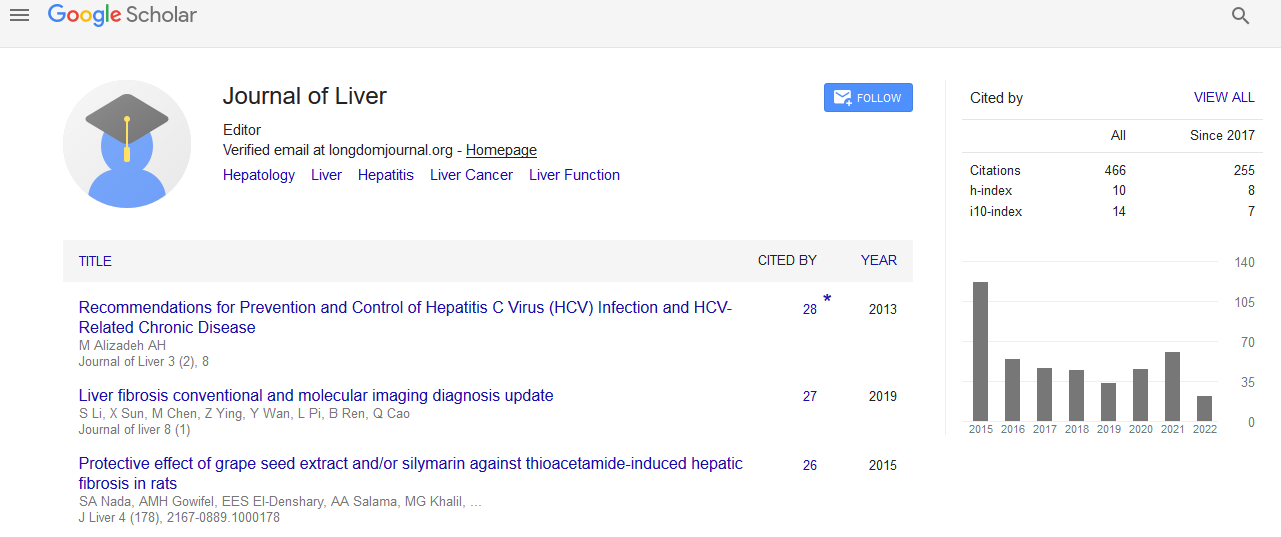PMC/PubMed Indexed Articles
Indexed In
- Open J Gate
- Genamics JournalSeek
- Academic Keys
- RefSeek
- Hamdard University
- EBSCO A-Z
- OCLC- WorldCat
- Publons
- Geneva Foundation for Medical Education and Research
- Google Scholar
Useful Links
Share This Page
Journal Flyer

Open Access Journals
- Agri and Aquaculture
- Biochemistry
- Bioinformatics & Systems Biology
- Business & Management
- Chemistry
- Clinical Sciences
- Engineering
- Food & Nutrition
- General Science
- Genetics & Molecular Biology
- Immunology & Microbiology
- Medical Sciences
- Neuroscience & Psychology
- Nursing & Health Care
- Pharmaceutical Sciences
Hepatitis outbreaks and surveillance: Advanced molecular detection and beyond
2nd International Conference on Hepatology
May 09-11, 2016 Chicago, USA
Sumathi Ramachandran
Centers for Disease Control and Prevention, USA
Scientific Tracks Abstracts: J Liver
Abstract:
Viral hepatitis, a major health problem worldwide, is caused by infections with 5 viruses, all belonging to different viral families. An efficient molecular surveillance of viral hepatitis is needed to track infections and devise strategies for timely interventions to interrupt viral transmissions. Increasing sophistication of molecular and computational approaches, coupled with complexity of the hepatitis genome, significantly contributes to the fact that molecular surveillance of viral hepatitis is limited in scope, and practiced by only few high-end laboratories in the world. The objectives of Division of Viral Hepatitis at CDC are to: (1) establish a modern, comprehensive and efficient molecular surveillance program for viral hepatitis; (2) reduce the cost of molecular testing; (3) reduce hands-on time; (4) simplify testing; (5) automate interpretation of molecular data into public health relevant information; (6) develop novel computational tools based on predictive mathematical models for detection of transmissions using Next Generation Sequencing data; (7) make this testing system freely available to public health departments and laboratories in the US and worldwide; (8) develop databases and high-performance computational tools and programs for rapid search of the database; (9) develop a website for easy access to the developed surveillance tools and applications; and (10) improve CDC capacity to detect and monitor dissemination of viral hepatitis, and to respond timely to outbreaks and other public health emergencies. The projected molecular surveillance system - GHOST (Global Hepatitis Outbreaks and Surveillance Technology), modernizes and improves CDC�??s capacity for global tracking of hepatitis infections, outbreaks, transmissions and facilitates public health intervention efforts.
Biography :
Sumathi Ramachandran has done her PhD in Molecular Biology from the Indian Institute of Science. After a brief stint as Post-doctoral Fellow, she got appointed as Faculty in the Emory School of Medicine. She has been with the Centers for Disease Control and Prevention for the last 12 years, and currently serves as a Senior Microbiologist. She has several Career Achievement Awards, acts as Member of Selection Committees and mentored many students and fellows. She has an exemplary publication record of more than 45 papers in reputed journals, and has been serving as an Editorial/Review Board Member of high-impact scientific journals.
Email: dcq6@cdc.gov

